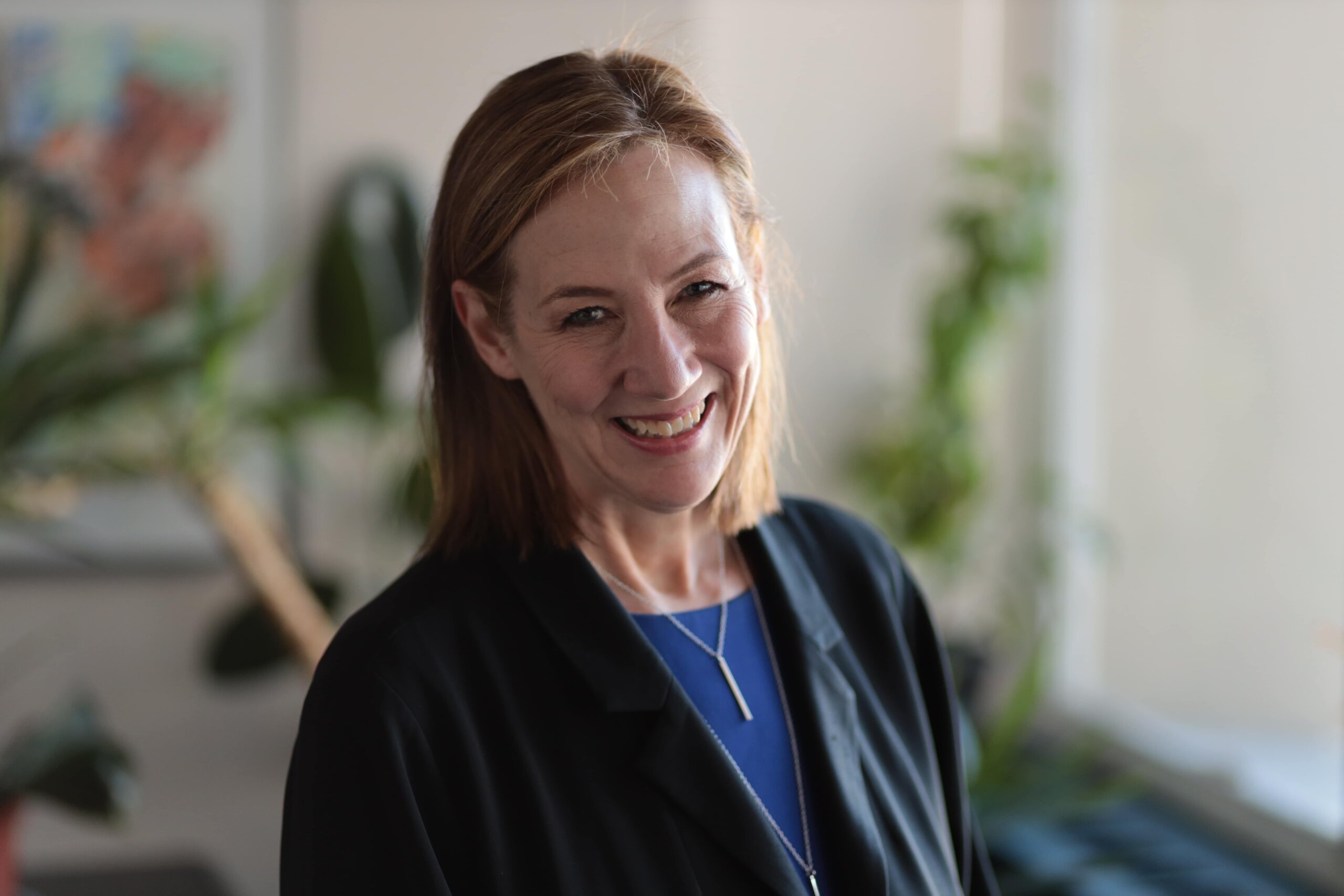Xtra has a new boss. On Jan. 4, Pink Triangle Press (PTP), which publishes Xtra, announced Jennifer McGuire as its new chief content officer.
McGuire is a big get. She ran CBC News for more than 10 years—longer than anyone else in the national broadcaster’s history and one of the few women leaders in a still-male dominated news industry. McGuire was responsible for all English-language news programs at Canada’s mother corp on TV, radio and digital, from the flagship newscast The National to World Report on CBC Radio to the CBC News website. As general manager and editor in chief from 2009 to 2020, McGuire integrated the broadcaster’s newsgathering teams and reoriented CBC News toward a digital-first strategy. Formerly executive director of CBC Radio, McGuire oversaw all genres of content including music, drama and comedy, in addition to journalistic programming. McGuire began her media career in Ottawa as a producer at a CBC local morning radio program.
I sat down with McGuire—my new boss—to discuss Xtra’s mission, what she brings to our newsroom and why on earth someone who had a huge staff reporting to her, including some of the biggest names in news, would want to come work with the small team at Xtra.
You are coming from running a very large legacy media organization, CBC News, to working with a very small—admittedly, mighty—team. No amount of wordplay can hide the huge disparity between the two. Why Xtra and our publisher Pink Triangle Press?
After CBC I spent some time at Oxford University, but I always knew that after my fellowship there ended I wanted to be back in an operational role within a media organization. I have lots of energy and still feel motivated to contribute. As someone who has spent most of her work years in public service media, the fact that PTP is mission-based was a big draw for me. I understand that on the surface a move to a much smaller organization might seem odd, but I like being positioned closer to individual teams, being part of a more nimble organization and being in a place that, at this point at least, is a little less in the centre of the public eye.
Most of all, PTP has a fantastic story. Xtra in particular is speaking about issues and from perspectives that legacy media is not paying enough attention to. It is important. I am excited to be part of this team and I hope we can increase our impact with audiences and also create other kinds of content to both serve and entertain LGBTQ2S+ audiences.
What do you bring to the Xtra newsroom?
I had one of the biggest media jobs out there at CBC, and that profile and those skills are now focussed on PTP. I have lots of expertise and lots of experience in leading a multi-platform media organization, one with both national and international reach. I am known as an innovator and a forward-thinker. At my core, though, I am a content person. I come from a content background and have done a variety of production jobs over the years in many genres across various audience touch points—radio/audio, television and digital. I think together we will create new content opportunities that will resonate with LGBTQ2S+ communities, here and internationally. I hope, as well, that my relationships within the industry will lead to new partnership opportunities for PTP.
How do you identify?
I am a cis straight woman.
Are you worried that there will be people who are upset that this position was filled by a straight cis white woman? How do you respond to that?
I am one part of a team and the team at PTP is diverse and representative of the queer and trans community. I am an ally and have been for a very long time, but I will be depending on the counsel of the team and the community for insights. I passionately believe in equity, diversity and representation; I think there is an opportunity to shift larger conversations in media (and society), and I hope Xtra and PTP can help lead the way. I intend to help bring more people to the content produced by this organization and I intend to help this organization produce more content while living up to the values of excellence and the promise PTP makes to serve its audiences.
I have people in my family and in my life who are part of the LGBTQ2S+ community. That said, I was not hired for my personal life experience but for my creativity, deep media experience and track record of being a transformational leader. My approach, always, is to be audience-facing and do everything I can to understand the habits, wants and needs of the various audiences we serve and from this will come more opportunities.
What about the adult dating site, Squirt, owned by PTP? Will you be involved there?
I will be involved in content development across PTP. Squirt is obviously very successful but as we renew content strategies, there might be other opportunities.
There is no doubt you had many successes at CBC, but there were serious controversies, too. What have you learned from those experiences?
Maybe I will have to write a book one day, we will see. I won’t speak about individuals, but let me talk about publicly managing changes to programming that has made headlines. There were headlines around the creation of The Current. There were headlines around making changes to music programming on Radio Two. Of course, more recently, there were headlines around The National.
In terms of insight, I think that as I have developed as a leader, I have realized a few important things, namely: involve people. Even when you think you have communicated things well, you likely have not communicated enough, especially around change. I also believe that as a leader you have to make yourself available and accountable, even when there is pushback or concern. In a public organization, this becomes a public narrative that can make you cringe if you Google yourself, but it is important to do.
It is also true that if you are leading from a place of looking forward, you often will be looking at things differently than others, and sometimes it takes time for everyone to become aligned. Of course, it goes without saying that you won’t please everyone, which is especially true when you work at CBC. I believe in being brave and in being bold, particularly within the creative industries. This is what leads to brilliant opportunities, magical things—but not always. Not everything will be successful. You also need to know when to regroup and cut losses, but the first stance should be to, smartly and strategically, go for it, share and own it.
What was the focus of your work as an Oxford Fellow?
I was looking at media ecosystems, particularly in public media, and the potential of competing organizations working together differently—a so-called co-operative economy in journalism. As you know, media organizations work together sometimes around big moments in democracies, like elections, but not really in many places systematically. We also know, as a whole, the industry is challenged. There are journalistic organizations, mostly in the public space, that are recognizing they have to shift their role in the system, particularly around local news, to support journalism and an informed citizenry. My time at Oxford was focused on this.
Obviously that is not what I am focused on here at PTP, but it is still very much an interest of mine. I hope that while here, we can work with other content, media and journalistic organizations in new ways that benefit us all.
Three years ago, your predecessor Ken Hickling, Xtra’s former editorial director Rachel Giese and PTP’s executive director David Walberg formulated a new mission for Xtra, one that focused on increasing our reach and impact internationally. I know you are just finding your feet, but what opportunities have you identified already to advance that mission?
It is too soon to talk about strategies. Right now, I am focusing on talking with people and learning. I will say, though, that I want the audiences of Xtra to grow and I believe there is opportunity in a world-view. For the content creators and for journalism—the bigger the audience reach, the bigger the impact, which I think speaks to the core mission and ambitions. I also know I will want to see development of other types of content, beyond what is currently being done. So fun as well as serious… colourful always.
What are you finding the most challenging?
I think coming on during COVID-19 and working remotely has not been the easiest way to get to know people, not to mention the joy of having dogs scratching at my office door to get in all the time but I feel that I am getting there. I am also learning multiple new technologies at the moment. While I have always been a digital futurist strategically, I am a bit of a klutz when it comes to hands on. I have tech help on speed dial! My thanks for their patience.
Why is independent LGBTQ2S+ media still important?
It is an important authentic voice that looks at LGBTQ2S+ representation, issues and perspectives as the primary concern. The voice is incredibly important. The focus is incredibly important. There is real urgency to do a better job of representing and advocating for marginalized members of the community whose lives, depending on where they live, are under threat. The issues are not “over-covered” at all. There is important work to do here. I don’t think it should be in a silo, though. I want it to grow and I want it to influence.


 Why you can trust Xtra
Why you can trust Xtra


